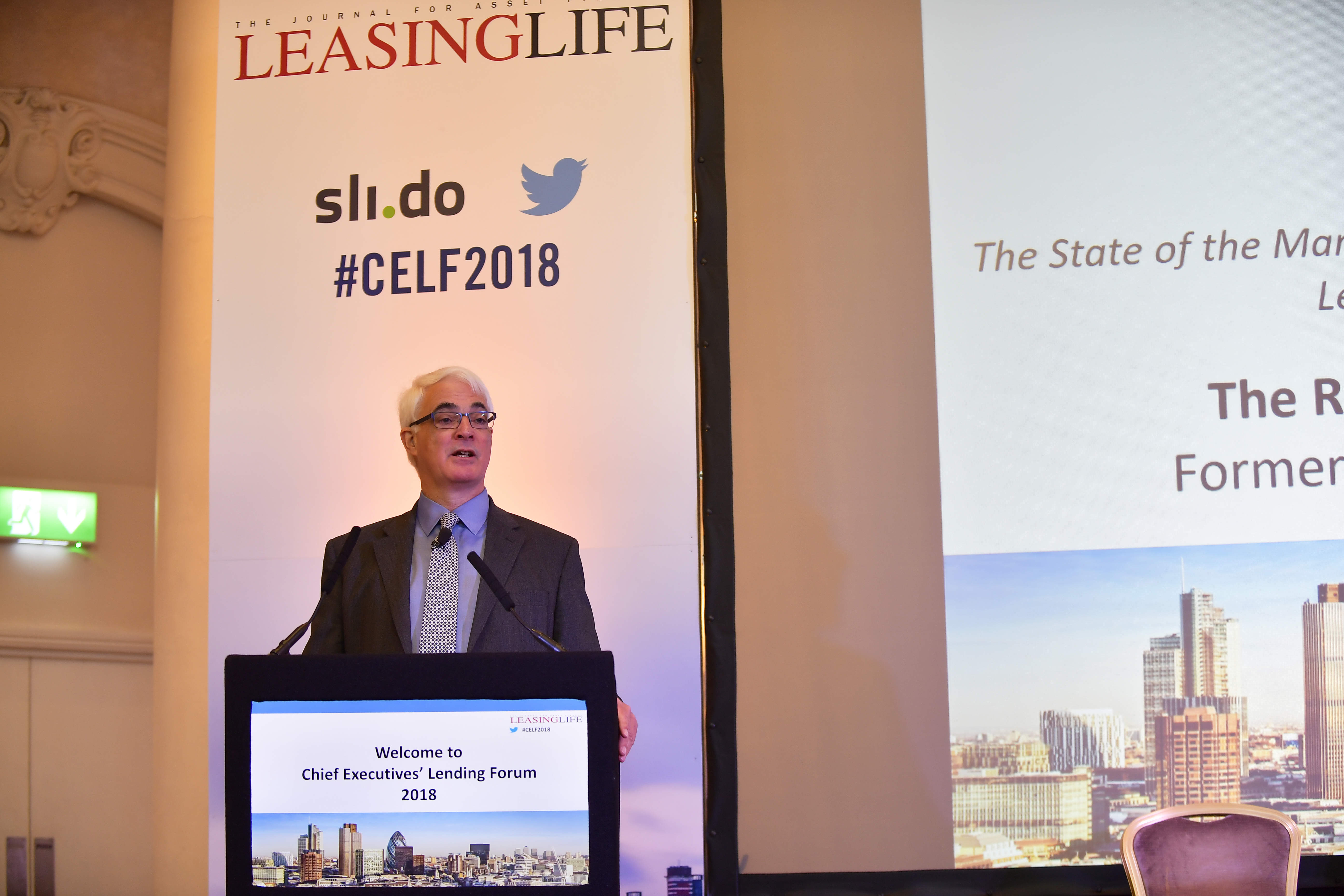
At the Leasing Life Chief Executives’ Lending Forum, Brian Cantwell spoke to former UK chancellor Alistair Darling about the global financial crash, Brexit and the outlook for British business.
Leasing Life (LL): Do you think Brexit will help or hinder the British entrepreneur?
Alistair Darling (AD): I think whatever the outcome it will not squash the entrepreneurial spirit, because even if you took the hardest of hard Brexits and you had a closed economy, the entrepreneurial spirit will find some way of operating.
If you put the question slightly differently and say: “What is the optimal environment in which to work?”, I would argue that it’s in an open economy – one that trades across the world, not just with the EU but with everywhere else.
Given that, especially in this area, you’re dealing with regulation which affects what people do, it’s better to have an influence on how that regulation is formed, which is one of the things which worries me about Brexit.
If European rules are made for Europe, we have to effectively comply with them, because anything we do in this country that we sell into Europe has got to be compliant, as we would do where we sell into America. With the entrepreneurial spirit, if the question is where you can develop it best, it is clearly where there is a big market. The UK is 60 million, the EU is 400 million.
How well do you really know your competitors?
Access the most comprehensive Company Profiles on the market, powered by GlobalData. Save hours of research. Gain competitive edge.

Thank you!
Your download email will arrive shortly
Not ready to buy yet? Download a free sample
We are confident about the unique quality of our Company Profiles. However, we want you to make the most beneficial decision for your business, so we offer a free sample that you can download by submitting the below form
By GlobalDataLL: What about SMEs?
AD: SMEs and micro SMEs basically would tend to operate in the UK, except they operate in an economic environment that is conditioned by bigger forces. Unless the macro environment is benign, it doesn’t matter that you’re just making things which you sell in the same town, never mind the same country.
If people in the same town don’t have the money to buy whatever you’re producing, that’s bad news for you.
LL: Would Brexit threaten another bailout? Would you do it again?
AD: When we did the bailout in 2008, one of the reasons it worked is because we were able to persuade the Americans and the EU to come in behind us, and the Americans – you
might remember – slightly changed their policy in the way they dealt with banks at that time.
The EU I remember… Sarkozy invited Gordon Brown to go to an EU meeting of ministers, which was unheard of in those times. Different levels did a similar sort of thing. I asked myself: if this happened today, post-Brexit, would you have the same leverage influence with the EU countries?
And, of course, on the other side of the Atlantic it’s an open question as to what a Trump administration would do. If you look at our banks and our financial institutions, certainly some of the larger ones, none of them confine their trade to the UK: they are global institutions. Some other than RBS are less global than they were, but they still trade across borders.
Anything you do to make co-operation more difficult or more reluctant [can cause problems] – and you can’t exclude human nature here. For example, if you just said to the rest of Europe: “We’re off, and we don’t like you,” and then you say: “Can you help us?”
Look at the expulsion of the Russian diplomats. France is now saying: “Well, we want to see some evidence.” The US has made a supportive statement, but several days have elapsed before it did.
LL: What about the French gas-supply issues?
AD: When I was Secretary of State for Trade and Industry, which included energy, in the winter of 2006 we had a deal to get gas, but somewhere between the French coast and the English coast it didn’t get across!
LL: So, in the event of a major financial issue, we might be less well prepared?
AD: We have got much higher debt now than we had 10 years ago. The debt levels are still very high, and will remain so for probably 30 years, if not longer. So with all these things, we were able to do the bailout – an immediate one of £50bn – but remember, there was also liquidity support and all the other things that went with it because nobody ever doubted our creditworthiness.
I remember during the day of 7 October 2008, when RBS got into deep trouble, we had to keep it trading until the American markets closed. So the Bank of England phoned its counterparts in the US Fed and said: “Do whatever it takes to keep that bank trading until close of play.” At no point did
they ever say: “Who is standing behind all this?”
The UK government is regarded as creditworthy, it has never defaulted in 300 years. If you contrast that with Ireland, when Ireland effectively had to underwrite basically all the customers of the three Irish banks, it took about 30 minutes for the market to say they were bigger than Ireland.
LL: If you had to relive the crash, would you do anything differently?
AD: The one thing with Northern Rock was that, if we had the powers that we had a year later, where we could simply get hold of a bank over a weekend, arrange for a merger, closedown or takeover or whatever, and get it back on the road by Monday morning, as we did with Bradford and Bingley, instead of having to go through finding a buyer to exhaust every possibility to avoid a challenge in court, and all of the rest of it, that would have been much easier.
It may of course, with the benefit of hindsight, have been much easier if it hadn’t happened in the first place, but there isn’t a developed country in the world with a banking system that can say: “Well, it didn’t happen to us.” It happened to everybody.
LL: Should the government move to create an infrastructure agency?
AD: After the Second World War, there was a reconstruction corporation set up and it went through various iterations, including 3i, which is now obviously sold off.
If you take the Northern Powerhouse, for example, which I think is a very good idea, to try and build other centres than London in England, in particular, is essential. But to do that you need better transport links, and there’s no reason why that can’t be controlled from the North-West rather than the South-East; in fact, it flies in the face of what you’re trying to do if you don’t!
In relation to housing, if you look at the Highlands and Islands Development Board, it was set up to arrest the long-term decline in the population, to try and get new businesses up there, and housing and regeneration. It was quite successful, because it’s something where if you’re going to do something big like that, you need the means to do it.
If you look at the ideas in England, they were mixed, frankly: some were good, some less so. I think, given that there still appears to be the ability or the political will to do something outside the big English cities, I can’t see how you can do that without some sort of mechanism. The RDAs were a good starting point.
LL: Should the British Business Bank become involved?
AD: Well it might do, although it doesn’t seem to be. It’s been set up to top-up the finance for SMEs and others; it’s doing a different sort of job. But then the Green Investment Bank did a lot…
LL: Did the sale of that rankle?
AD: Well, it seemed to fly in the face of what they were trying to achieve. If you think there
was a market failure here and you needed someone to come in and, what, it was sold five years after it got set up?
It’s not just because it happened to be in Edinburgh, 10 minutes down the road from where I live. I’m not convinced there was a case, other than they needed the capital receipt!
LL: Referring more to ideas of leasing, do you think British attitudes to ownership have changed?
AD: I think they have. Self-evidently, an awful lot of British people don’t own the car in which they drive.
In the 1950s and 1960s it was a big thing to do with aspiration: “I own my own car.” The other was HP, as you got loans rather like mortgages as so on.
I don’t think people now are bothered that much about whether they own or whether they lease. Frankly, most people who have got a car don’t intent to keep it long term. It’s passing through. The important thing is that you understand what you have done. If you own it, what are the consequences, and if you lease it, what are the consequences?
If you look at housing, up until the 1950s, most people rented, and after that the aspiration was to buy. Now we’re going back to renting.
It’s necessity, I expect, at the moment, although rationally, when I was young I bought a house when I was 23. In Germany, for example, you tend to buy a house when you’re in your 40s, because of the nature of the labour market. These things change.
LL: How many similarities do you see between now and the crash with regards to attitudes to lending?
AD: Apart from the fact that you would like to think [knowledge] was passed on down the generations, but it is difficult, because in 20 years’ time there won’t be many left who are in banks, and there won’t be that many cautionary tales. All you can do, either through common sense or the regulatory system or whatever, is just say: “Whatever it is, it can go wrong.”
A lot of [the issues] today are dominated by new technology and all the rest of it, which is great, except it can go wrong. If you can get all that access to this information, somebody else can too!
There is no easy answer: you can’t send someone on a course! People should be well advised that “history repeats itself” isn’t an idle thought. People forget.
LL: Is there enough separation between politics and after-political careers in the finance industry?
AD: If you take ACOBA [the Advisory Committee on Business Appointments], it’s only got control for the first two years, after that, you can’t.
If you look at the membership of the House of Commons, right now it is much younger than when I went in 30 years ago. I assume one of the consequences will be that a lot of them will not be there in another 30 years: they will go back into non-public life.
I think you would be in great difficulty if you said: “Look, if you’ve ever been an MP you can’t go and work for X or Y.”
I’m not actually sure if I’ve seen any evidence of someone in government say or do something where they’ve directly benefitted from it. I don’t recall having seen it. If that is what you want to stop, then you need to strengthen the ACOBA regime. But at what point does it fall off?
LL: With reference to our readers, isn’t there necessarily a relationship between politics and finance, with politicians moving between the two?
AD: It is very difficult, but no more than if you get an MP that represents anywhere with a financial centre or business in it.
My area is Edinburgh, which until recently had two banks headquartered there: Standard Life and Aberdeen. Because you speak to people, the question is: “Are you close?”
Rather than try and deal with it generically, if there’s a particular problem, you deal with it by having a regime that says no based on a couple of years.







